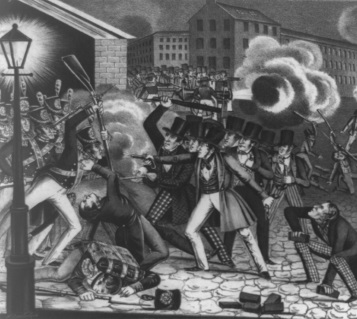Many Baltimore Republicans justified violent retribution against the anti-war movement, arguing that Federalist protests made them treacherous “Tories.”
“We’ll root out the damn’d tories. We’ll drink their blood. We’ll eat their hearts.” a witness to the Baltimore riots recalling the shouts from the crowd

Library of Congress, Prints and Photographs Division
Populated by large numbers of French, Irish and German immigrants, Baltimore was not a particularly hospitable place for Federalists, especially those who dared to speak out against the War of 1812. So when the hated anti-war Federalist newspaper Federal Republican published an editorial condemning President Madison’s June 1812 declaration of war, matters turned ugly. Republican crowds converged on publisher Alexander Contee Hanson’s office, destroying his printing press, and forcing him to flee. Intimidated city officials appeared reluctant to intervene. The ensuing violence underlined just how differently various American factions viewed the events surrounding the war.
When Hanson’s paper reappeared on the streets in July 1812, mobs reassembled, this time outside his rented office. Well-known local Federalists, including Confederate General Robert E. Lee’s father, Henry “Light Horse Harry” Lee, vowed to defend Hanson, further aggravating the growing mob. When the besieged Federalists accepted an offer to relocate to the city jail for protection, the mob advanced on the jail.
The mob brushed aside the jail’s defenders, killing Revolutionary War General James M. Lingan with a knife to the chest, and severely injuring eleven others. Among the wounded were Lee, who never recovered, and Hanson, who died in 1819 at the age of 33.
Though the Maryland legislature condemned city officials for their negligence, many Republicans justified the violence. They argued that Federalist protests against the war made them treacherous “Tories” who threatened American security. An observer who witnessed the riots later remarked: “All I ever read of the French Revolution does not equal what I saw and heard last night. Such expressions as these were current—‘We’ll root out the damn’d tories.’ ‘We’ll drink their blood.’ ‘We’ll eat their hearts.’”
During an earlier highly politicized conflict, the Quasi War with France, Federalists under President John Adams had tried to suppress wartime dissent through the passage of sedition laws. That legislation raised howls of protest among Jeffersonian Republicans. In one of the many ironic twists of the highly partisan War of 1812, many Republicans, including Attorney General William Pinkney, urged that similar sedition laws be reenacted, this time to quell Federalist wartime opposition. Wartime events had led to a dramatic political reversal.
Last updated: November 10, 2017
